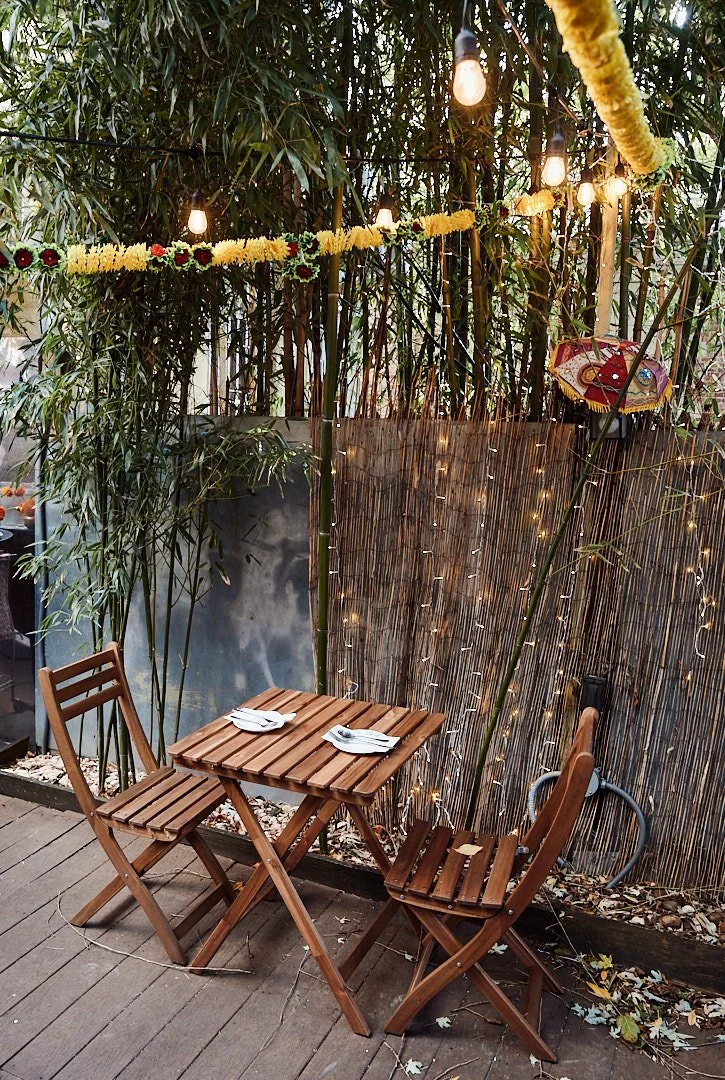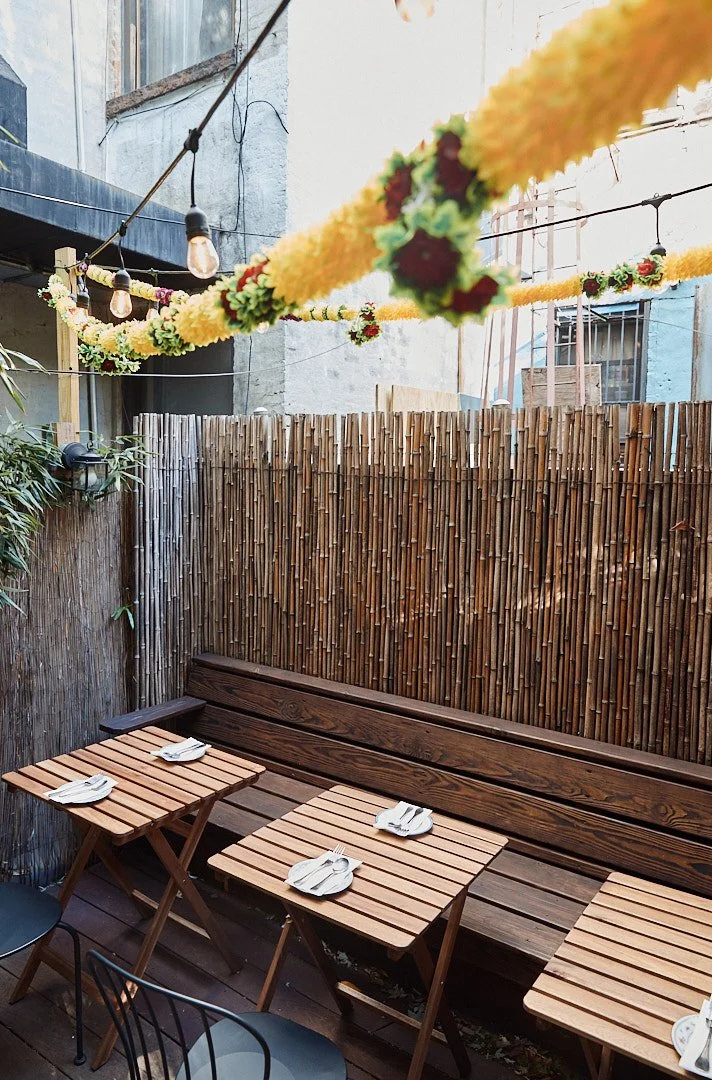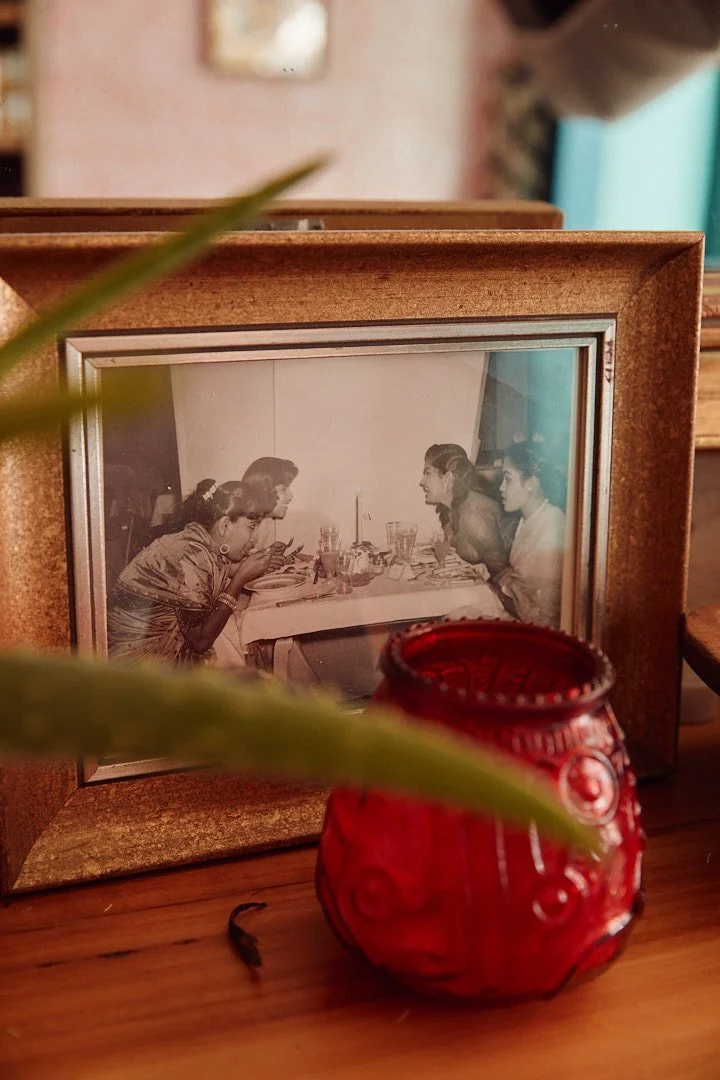The relatively new, turquoise storefront and brightly painted window on Court Street in Cobble Hill is Tera Mera, a Bombay-style small plates restaurant that is shifting perceptions about Indian food and hospitality.
Upon entering Tera Mera, before even making it into the main dining area, you’re greeted by the aroma of Masala Chai and delicious spice blends that beckon you forward. So you walk up to the bar, past rows of tables and low couches begging you to get comfortable and stay a while; past the antique bookshelves with beautifully curated collections of photos, packaged foods, coffee, chutneys, and other South Asian culinary delights. Now you’ve reached the counter: the giant Victorian wall mirror, the magical chai machine, and of course, more cookies and delights to choose from. You order your Masala Chai, and they also have Cardamom Chai, but I prefer the Masala, and it comes out topped with a Parle-G cookie (for the uninitiated, think of a digestive cookie; just try it, you’ll like it). After chatting with the charming staff, you’ll probably notice a magnetic, shorter woman coming around the counter and sweeping through the restaurant. She never stops moving, but once she sees you, she gives you her undivided attention in a way that is almost startling these days. She asks if you have everything you need. If the restaurant is busy, she’s on to deliver the plate of Pani Puri or something else equally delicious. If it’s quiet, she may turn that magnetic energy on you, and if so, you’re in for a real treat. Congratulations, you’ve just met Shalini, one of Tera Mera's co-owners.
Tera Mera is the brainchild of Shalini Vaswani and Kathleen Jeremie. This incredible duo had always worked in hospitality, from catering to private chefs. A few years ago, their successful catering business evolved, and they became permanent vendors in the Industry City food hall under the name Taza Market. After spending a few years and gaining a dedicated following, they started feeling some growing pains, and their longstanding dream of opening a standalone location became undeniable. The goal was to find a space where they had complete autonomy to design an entire experience. They wanted to invite guests into an intimate and intentional environment, showcase the culinary culture, and expose people to new flavors, traditions, and products. When the storefront on Court Street became available, they jumped at the chance.
The dream was a restaurant and market that felt like the home Shalini and Katherine grew up in. Shalini’s mother immigrated to New York from Bombay and became an active member of New York’s Indian community, hosting Diwali balls and creating a warm and vibrant environment centered around hosting and showing care through food. This is why throughout the space you’ll see family photos, prints of the cookbooks her mother brought with her from India when she first immigrated to America, handwritten recipes, and other heirlooms and design choices that harken back to their childhood home. In many ways, Kathleen and Shalini have recreated a home to share in the guise of an inviting restaurant, and you feel the difference as soon as you enter. The care and intentionality are present everywhere you look.
The menu changes regularly and always features one Sindhi dish. The Sindhi people are a minority group from Northern India, many of whom lost their land and were displaced during Partition. Partition refers to the period in 1947 at the end of British rule, when India and Pakistan were divided into separate countries along religious lines. This division sparked the largest forced migration in world history. The Sindh community has been scattered and now converges in small enclaves around the world. To honor her family’s legacy, you’ll always find one Sindhi dish on the menu.
The most important part of this whole project for me was when I asked them why. What was it that made you create this magical place? (And it is magical, go see for yourself). Shalini looked at me and simply said, I created the thing I needed, and it turns out other people needed it too.
Creativity and creative work are hard work. It takes bravery to take the kinds of risks that make restaurants, or any creative venture, successful. But it was an incredible reminder that the risks worth taking are the most personal ones. It’s the thing you need to make, because you can’t keep dreaming about it and not give it life. It’s the thing that is literally harder not to do. And so you take the risk. And I’m so grateful to Shallini and Kathleen for taking that risk and creating the living embodiment of what happens when you finally do the thing you were called to do.
Tera Mera is also based on the value of cultural exchange. The seasonal menu features dishes from all over India, celebrating the subcontinent’s incredible culinary diversity. It has become a magnet for the South Asian community in Brooklyn. Their market section features up-and-coming and small-batch South Asian specialty food brands that are not yet producing at a scale where they could thrive in larger outlets. Shalini and Kathleen know that these brands require a bit more customer education to thrive, and they feel strongly about taking on that role. Through Tera Mera, Shalini and Kathleen want to support the entire ecosystem of creativity in the South Asian community, from featuring these brands, to giving the community an enjoyable hub to fulfill their shopping needs to highlighting other artisans, musicians, and performers from Brooklyn’s Indian community.



























